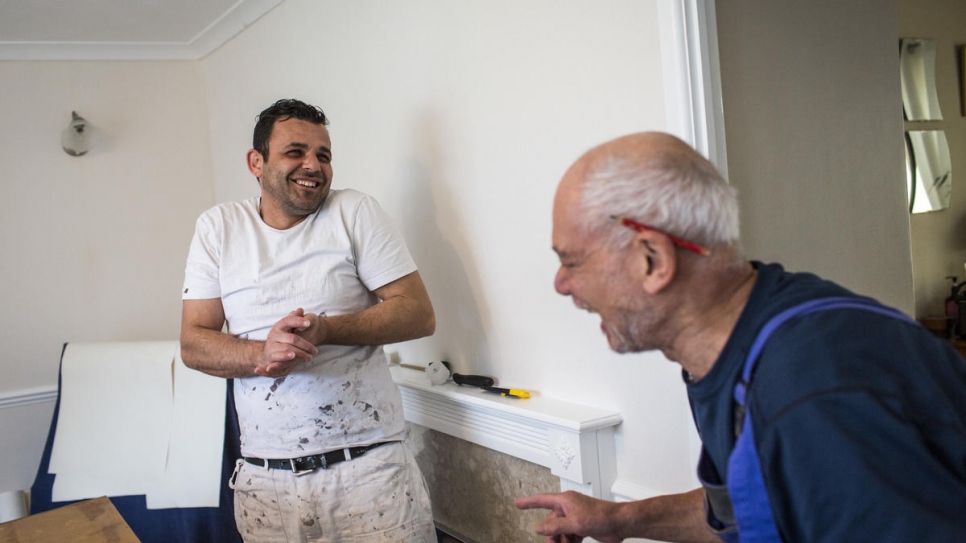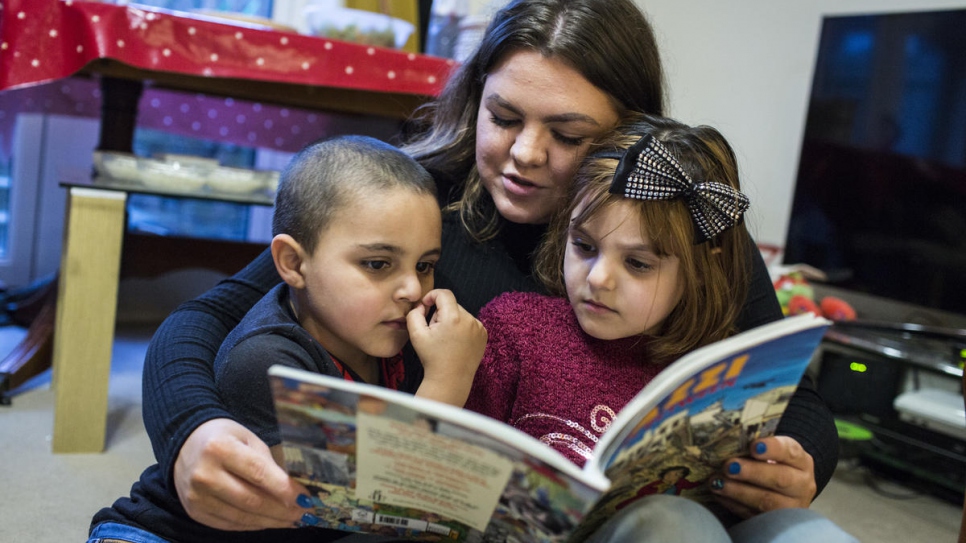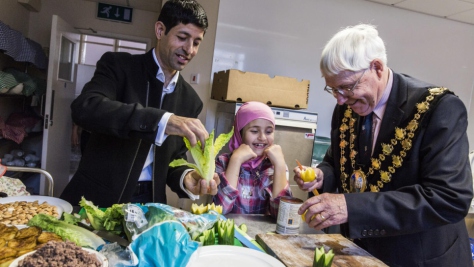Rural Devon Community Comes Together to Embrace Syrian Family
Syria refugee family are sponsored by locals, helping them re-anchor after the pain of flight from war
Hani Arnout, 34, and his wife Ameh, 23, share a joke with friends at home in Ottery St Mary, Devon, south-west England.
© Andrew McConnell
Ottery St Mary, Devon -- On a night before lockdown in this small West country town, the sounds of the darbuka, a Syrian drum, pounded out into a non-descript lane of newly built terraced homes, bringing a taste of the Levant to England’s rural West Country.
Welcome to the home of Hani Arnout, 34, and his young family. Indeed, all are welcome here. The door is unlocked, even on gloomy days, and neighbours, friends and members of the local refugee sponsorship network come and go, usually after eating a few tasty Syrian delicacies.
“Here I know everyone. It’s my new life. I can’t believe I’m here now. I look out of the window and find it hard to believe,” Hani told UNHCR, the UN Refugee Agency, on a visit last year. “When I sleep, I dream nice dreams now. Gone are the bad dreams. I try not to remember anything before 2018.”
Hani is one of about 450 refugees who have been embraced by local community groups up and down the UK under the government’s community sponsorship programme, which allows charities, faith groups, businesses and other local groups to support the initial reception and integration of refugees directly in the UK.
The sponsors provide specific support in the early days of arrival including access to English lessons and schools, and helping to navigate benefits, healthcare and employment or training. The rest is up to the groups and the families.
Until now, the refugee arrivals, mostly Syrian, have come from the Vulnerable Persons Resettlement Scheme (VPRS), managed by UNHCR and the Home Office. That programme is due to expire soon and the government has committed to resettling refugees from across the world at a similar rate.
Refugees being sponsored by local groups will be in addition to those arriving through the quotas of the new global resettlement scheme.
The needs globally are huge. UNHCR estimates that over 1.4 million refugees currently residing in 62 host countries will be in need of resettlement next year. In 2019, 26 countries admitted 107,800 refugees for resettlement. This year only 57,600 resettlement places have been made available by states to UNHCR. Unfortunately, COVID-19 will impact the full realization of these resettlement spaces.
Supporting refugee integration is not easy; it often takes time and requires specialised support. But refugees like Hani, who now works locally as a handyman and decorator, are keen to repay their hosts and stand on their own feet again.
Back in Syria, Hani was jailed and tortured by extremists and missiles rained down around the family home, now destroyed, near Damascus. He braved snipers, checkpoints and other dangers to escape and eventually found safety in Jordan. Friends and family are scattered, some forever lost.
But Hani and his family are moving beyond the pains of the past, and life in Ottery now has a new, lighter, rhythm. After work, Hani enjoys drumming sessions with a local, Steve Chapman, whose wife Sandra and daughters Amy and Luisa often drop by to help read English with two of the Arnout’s kids, Abdul, 4, and Nour, 6.
For Ameh, Hani’s wife, there are day trips, when the weather allows, sewing classes and baby dance classes. Their youngest child Mary was named after their new home town. “Its been a beautiful time,” she said, speaking confidently in English, picked up during her first year. “I’ve got to know so many people in the town.”
Indeed, the hope is that after two years or so the group structure fades away and the family becomes fully independent and relationships shift from being support-based to friendship-based.
The family themselves are keen to start returning the favours that they have benefitted from. The family has coped well with the restrictions of the pandemic, notwithstanding frustrations on their ability to socialise. Hani went back to work soon after the lockdown and is gradually building up his decorating-gardening work. Amneh is working towards her driving theory test and making plans for when Mary starts at preschool. Nour and Abdul have settled back into school well this term after the enforced classroom break.
“Our role should diminish over time as the family becomes independent,” said Anna Roderick, who leads Abide, the Ottery sponsor group that emerged from local parishes but also drew on non-faith support.
She added that Hani and Ameh’s outgoing and warm nature means that people gravitate towards them and want to help the family. “Ideally we all transition to just being friends and things become reciprocal. We’re moving towards that. Ultimately, I have accountability to the Home Office and the church. Emotionally, I should stay removed, but it’s not always easy.”
Rosie Hall, part of the support network, is helping the family with medical appointments. “It’s been good for us,” she said strolling around town with Ameh and Mary. “The town’s been really supportive and it’s actually brought the community together in many ways.”
Syrian Families Find a Warm Welcome in West Wales
Refugee Family Gives Back by Cooking Meals for Cardigan Care Workers helping fight COVID-19
'Mini Community' Forms in Peckham to help Refugee Family Rebuild
First meeting of volunteer group drew over 100 locals; They plan to sponsor another family, once conditions allow
'This has had Such a Ripple Effect': Volunteers Help Syrian Family Rebuild in Liverpool
'Tables have turned' as refugees offer support to sponsors during pandemic













